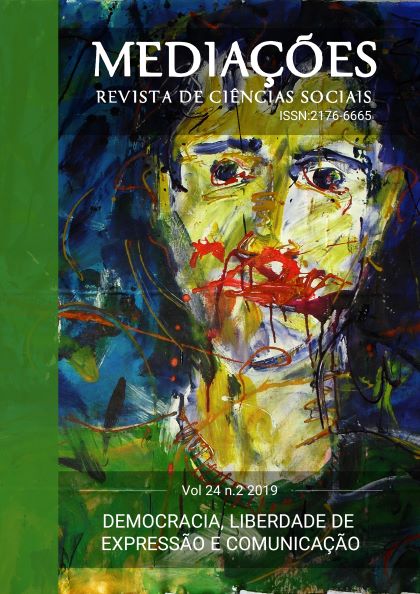The limits to freedom of speech: an analysis of the debate concerning prohibitions of hate speech from an emblematic case
DOI:
https://doi.org/10.5433/2176-6665.2019v24n2p56Keywords:
Freedom of speech, Hate speech, Robert C. Post, Beauharnais, Public discourseAbstract
The purpose of this article is to investigate the debate concerning the permissibility of restrictions to hate speech setting of from an emblematic case of the Supreme Court of the United States: Beauharnais v. Illinois, from 1952. The analysis of the arguments 1 Mestre em Filosofia e Teoria Geral do Direito pela Faculdade de Direito da Universidade de São Paulo e gestor de projetos no Instituto Pro Bono (IPB, São Paulo, SP, Brasil). Email: oc.azevedo@gmail.com. ORCID: https://orcid.org/0000-0001-5426-6435. OCTAVIO SAMPAIO DE MOURA AZEVEDO I Os Limites à Liberdade de Expressão 57 presented by the Justices in their opinions will enable us to identify the central points of controversy of the debate, so as to create a reliable metric to better understand it. In addition to the arguments discussed, the thoughts of Robert C. Post on the subject will also be brought to the present investigation, specially his conception of freedom of speech founded in the idea of selfgovernment, the different categories of harms caused by hateful speeches and his concept of public discourse. Through this investigation, we aim to bring more clarity to the concepts and categories of the debate, pointing out what really is at stake when we discuss restriction of freedom of speech in these cenarios.Downloads
References
BRASIL. Supremo Tribunal Federal. Habeas Corpus 82.424-2 Rio Grande do Sul. Habeas-corpus. Publicação de livros: antisemitismo, racismo, crime imprescritível, conceituação, abrangência constitucional, liberdade de expressão, limites, ordem denegrada. Paciente: Siegfried Ellwanger. Impretante: Werner Cantalício Jão Becker. Relator: Min. Moreira Alves, 17 de Setembro de 2003. Disponível em: http://redir.stf.jus.br/paginadorpub/paginador.jsp?docTP=AC&docID=79052. Acesso em: 11 jul. 2019.
CANADÁ. Criminal Code (R.S.C., 1985, c. C-46). 1985. Disponível em: http://laws-lois.justice.gc.ca/eng/acts/C-46/section-319.html. Acesso em: 11 jul. 2019.
UNITED ESTATES SENATE. (Constituion [1791]). Constitution of the United States 1791. Disponível em: https://www.senate.gov/civics/constitution_item/constitution.htm#amendments. Acesso em: 11 jul. 2019.
GROSS, Clarissa Piterman. Pode dizer ou não? discurso de ódio, liberdade de expressão e a democracia liberal igualitária. 2017. Tese (Doutorado) - Faculdade de Direito, Universidade de São Paulo, São Paulo, 2017.
HARE, Ivan; WEINSTEIN, James. Extreme speech and democracy. Oxford: Oxford University Press, 2009.
LEGAL INFORMATION INSTITUTE. Beauharnais v. people of the state of Illinois, 343 U.S. 250. 1952. Disponível em: https://www.law.cornell.edu/supremecourt/text/343/250#writing-type-1-FRANKFURTER. Acesso em: 11 jul. 2019.
LEGAL INFORMATION INSTITUTE. Brandenburg v. Ohio, 395 U.S. 444. 1969. Disponível em: https://www.law.cornell.edu/supremecourt/text/395/444. Acesso em: 11 jul. 2019.
LEGAL INFORMATION INSTITUTE. Chaplinsky v. New Hampshire, 315 U.S. 568. 1942. Disponível em: https://www.law.cornell.edu/supremecourt/text/315/568. Acesso em: 11 jul. 2019.
LEGAL INFORMATION INSTITUTE. R.A.V. v. City of St. Paul 505 U.S. 377. 1992. Disponível em: https://www.law.cornell.edu/supremecourt/text/505/377. Acesso em: 11 jul. 2019.
MACEDO JÚNIOR, Ronaldo Porto. Freedom of expression: what lessons should we learn from US experience? Revista Direito GV, São Paulo, v. 13, n. 1, p. 274 - 302, 2017.
MATSUDA, Mari J.; LAWRENCE III, Charles R.; DELGADO, Richard; CRENSHAW, Kimberlè Williams. Words that wound: critical race theory, assaultive speech and the first amendment. Boulder, Colorado: Westview Press, 1993.
POST, Robert C. Meiklejohn's mistake: individual autonomy and the reform of public discourse. Faculty Scholarship Series, New haven, p. 1109-1137, 1993.
POST, Robert C. Participatory democracy and free speech. Virginia Law Review, Virginia, v. 97, n. 3, 2011.
POST, Robert C. Racist speech, democracy, and the first amendment. William and Mary Law Review, Williamsburg, Virginia, v. 32, p. 267-327, 1991.
POST, Robert C. The constitutional concept of public discourse: outrageous opinion, democratic deliberation, and hustler magazine v. falwell. Faculty Scholarship Series, New haven, 1990.
REINO UNIDO. Public order act. 1986. Disponível em: https://www.legislation.gov.uk/ukpga/1986/64. Acesso em: 11 jul. 2019.
SARMENTO, Daniel. A Liberdade de expressão e o problema do hate speech. In: SARMENTO, Daniel. Livres e iguais. Rio de Janeiro: Lumen Juris, 2006. p. 207 - 262.
SILVA, Júlio César Casarin Barroso. Liberdade de expressão e expressões de ódio. Revista Direito GV., São Paulo, v. 11, n. 1, p. 37-64, jan-jun 2015.
WALDRON, Jeremy. The harm in hate speech. Cambridge: Harvard University Press, 2012.
Downloads
Published
How to Cite
Issue
Section
License
Copyright (c) 2022 Octavio Sampaio de Moura Azevedo

This work is licensed under a Creative Commons Attribution 4.0 International License.
Copyright on articles published in Mediações belongs to the author(s): in the case of partial or entire republication of the original publication, we ask author(s) to indicate the original publication in the periodical.
Mediações uses the Creative Commons Attribution 4.0 International license, which allows Open Access, enabling any user to read, download, copy and disseminate its content so long as adequately referenced.
The opinions expressed by the author(s) are their sole responsibility.

































